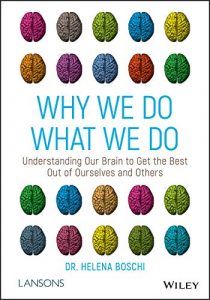The answer to the book’s title questions goes pretty much back to our brain. It’s still a mystery that we are resolving piece by piece. Neuroscience has been steadily gaining insights into our biological system that consumes 20 % of our energy.
If you’re asked why you acted as you did the answer is not obvious. Many of our daily actions are unconscious or habits that we have formed over the years.
How we eat, sleep, exercise (or not) has a huge impact on our well-being. Our long human history of survival has deep imprints on our modern ways of living.
We are still biased towards fight or flight responses and almost everything in us is still tilted towards survival. We discount good news, pay more attention to the negative, and have strong biases and prejudices.
Dr. Helena Boschi has put together an extensive overview of different aspects of neuroscience research and knowledge that is easy to grasp and not too academic. It explains the basic mechanisms simply and has practical applications for personal life as well as for business and leadership purposes.
We are emotional creatures first, and logical only second. The first response is fast, intuitive and emotional. It encapsulates our biases, assumptions and mistakes. This is why it’s a good idea to sleep over big decisions and let the slower decision-making system kick in that is more logical and rational. It counterbalances the first response gut-feeling.
Our memories are flickering. Every time we remember something we are reconstructing the very memory based on our current state. Emotional significance emphasises certain aspects and therefore others see the same incident differently.
It is a good idea to keep a record of your decision-making process so that you can go back to your thought processes and not rely on your (unreliable) recollection that changes on every memory retrieval.
If there’s one magic trick for improving your overall well-being it’s sleep. Have enough of it, and you may even live longer. Another amazing remedy is exercise. The simple things have long-lasting effects but like healthy eating, we just need to stick to them.
Our brain is constantly overflowed with information, 90 % of which is visual. Most of the information is filtered out before it reaches our attention. Sense of smell is the only one that is hardwired to bypass the filtering.
We don’t see what we don’t expect to see, and our brain fills the missing pieces of information based on our prior knowledge. A fresh pair of eyes to any problem from someone who has a different background, experience and knowledge domain can approach the topic at hand from an entirely different perspective.
The book gives ideas for communication, marketing and branding. We respond to nouns quicker than verbs, we see words as shapes and visual associations. It’s easier to accept something new if we are given a good reason, and we are explained why.
Our hardwired programming towards negative emphasises and give additional influence on anything negative sounding. Just seeing the word ‘no’ or a similar word triggers the same hormones and neurotransmitters as what happens in stressful situations. This sets us to expect something painful to arrive and the body prepares to receive it.
Similarly, using ‘but’ in a sentence cancels everything before it. And to add to the confusion, if you’re using “don’t” to tell someone not to focus on something that has the exact opposite effect. We cannot help but focus on that.
So, why we do all these things?

